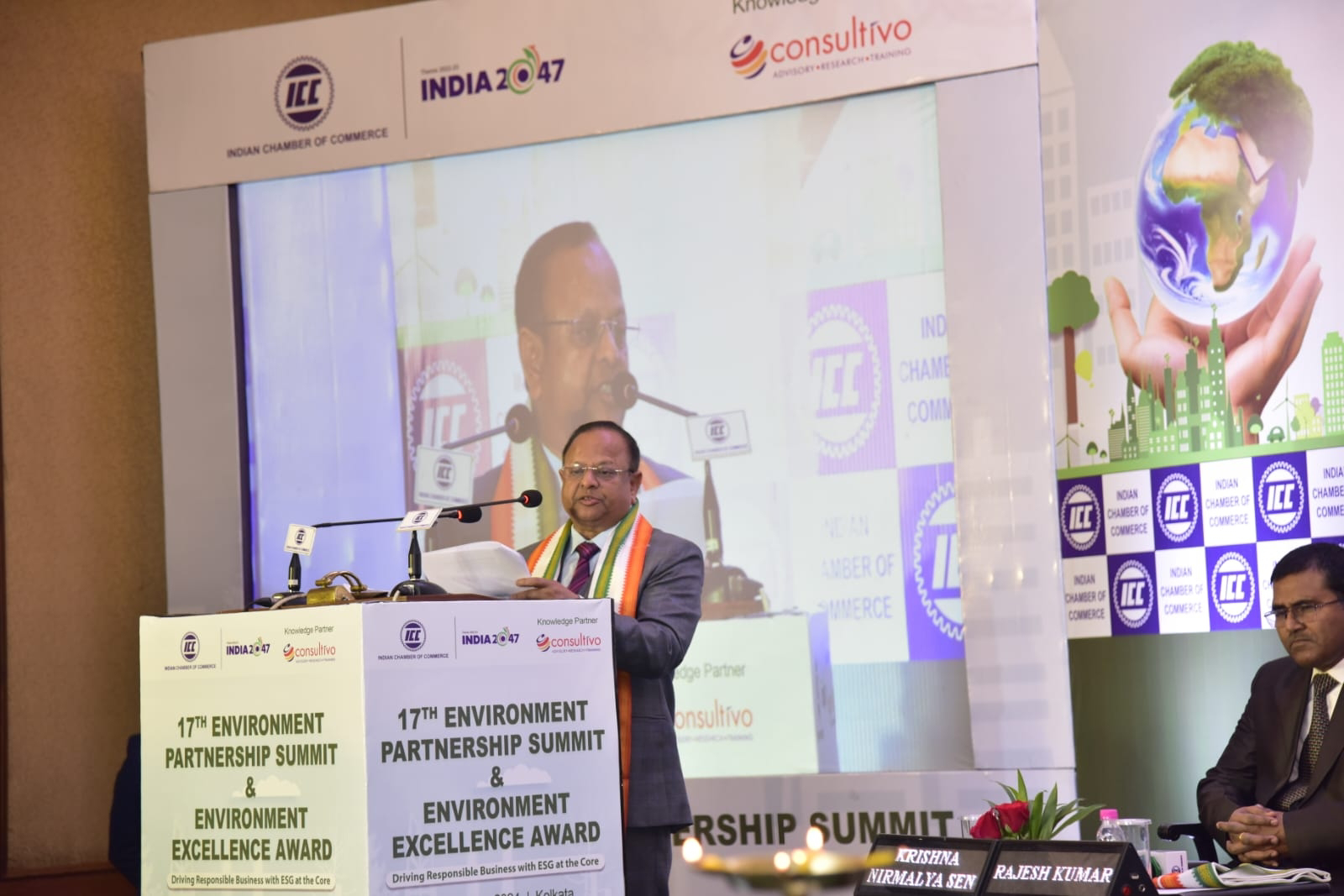Kolkata, 13th January 2024: Indian Chamber of Commerce (ICC) organised its 17th Environment Partnership Summit to discuss the Driving Responsible Business with ESG at the core along with session on Building Meaningful ESG Strategies for a Sustainable Business & Environmental Dimensions of Sustainability. The session witnessed valuable insights from Md Ghulam Rabbani, Hon’ble Minister in Charge, Dept of Environment, Government of West Bengal; Dr Rajesh Kumar, IPS, Member Secretary, WBPCB; Dr Krishna Nirmalya Sen, Chairman, ICC OHSE Committee & Head- EHS, L&T MMH; Aloke Mookherjea, Chairman Jury Board, ICC Environment Excellence Award; and Sudipta Mukherjee, ED (Generation), CESC Limited.
Md Ghulam Rabbani, emphasised the evolving possibilities in the current era, stated, "We are entering an era where carbon emissions pose a significant concern. In response, businesses are increasingly acknowledging the imperative of sustainability, encompassed under the umbrella term ESG. Under the leadership of our Chief Minister, Mamta Banerjee, the West Bengal government envisions an economy that not only thrives in profitability but also actively contributes to building a sustainable environment."
Highlighting West Bengal's commitment to environmental sustainability, Rabbani noted, "West Bengal currently ranks 11th nationally in environmental sustainability. The global landscape of ESG is swiftly changing, presenting challenges that demand urgent attention. Worldwide, there is a universal demand for sustainability and leadership bears the key responsibility in addressing this issue." Referring to Kolkata as a business city, Rabbani pointed out, "West Bengal is home to numerous organisations dedicated to ESG goals. Leaders in the state are well-informed and actively implementing strategies to effect positive change. Measures are being taken to reduce carbon footprints, with many colleges adopting solar panels. As global warming and climate change become increasingly pressing concerns, our Hon’ble Chief Minister has taken proactive steps through robust environmental policies."
Highlighting the state's commitment to renewable energy, he stated, "The Government of West Bengal has implemented effective policies, offering financial subsidies and promoting the adoption of solar energies. These initiatives aim to transform the state's economy into a green one. Additionally, efforts are directed towards providing organic fertilisers for landscaping, clay pack formation, and roadside beautification. The construction of Net Zero buildings is on the rise, reflecting the state's proactive stance on environmental issues." Expressing optimism for the future, he concluded, "Business, as the backbone of the nation, plays a crucial role. We firmly believe that West Bengal will emerge as a leader in terms of environmental, safety and security standards."
Dr Rajesh Kumar, IPS, Member Secretary, WBPCB, emphasised the importance of corporate responsibility and environmental compliance, stated, "Each and every company is striving to contribute positively. The Government of India has mandated BRSR submissions, evaluating adherence to ESG norms. We aim to create a system that yields meaningful reports, assessing companies' waste management and water affluency compliance. Our goal is a collaborative effort towards achieving the mission of a developed nation. Companies must address environmental concerns and by working together, we can make a significant impact. The four principles of ecology guide us: Nature knows best, everything is connected, everything must go somewhere and we must question our actions today. The alarming rise in cancer cases is linked to industries discharging untreated water into rivers, impacting public health. Our focus is on ensuring only treated water is released. All generated waste should find purpose. Some industries produce excess heat, now repurposed effectively. Initiatives may face criticism or seem challenging but persistence leads to success. "
Dr Krishna Nirmalya Sen, Chairman of ICC OHSE Committee & Head of EHS at L&T MMH, emphasised the significance of the G20 agenda and its profound impact on climate change and livelihood. In his welcome address, he highlighted the Indian economy's commitment to establishing a green and sustainable environment, placing Environmental, Social, and Governance (ESG) principles at its core."
Sudipta Mukherjee, Chief Advisor (Generation), CESC Limited, emphasised during his vote of thanks, "ESG considerations are integral in maintaining a positive corporate image, aligning with the objectives of a conscious market and attracting responsible investors. India, as the fifth-largest growing economy, has the opportunity to embrace ESG reductions that have transformed advanced economies. SEBI has introduced a BRSR framework for 100 listed companies. According to a recent survey, 75% of Indian companies are now reporting on the sustainability factors and ESG performance of their organizations. We need to elevate awareness about ESG and waste management for a sustainable green environment."







0 Comments